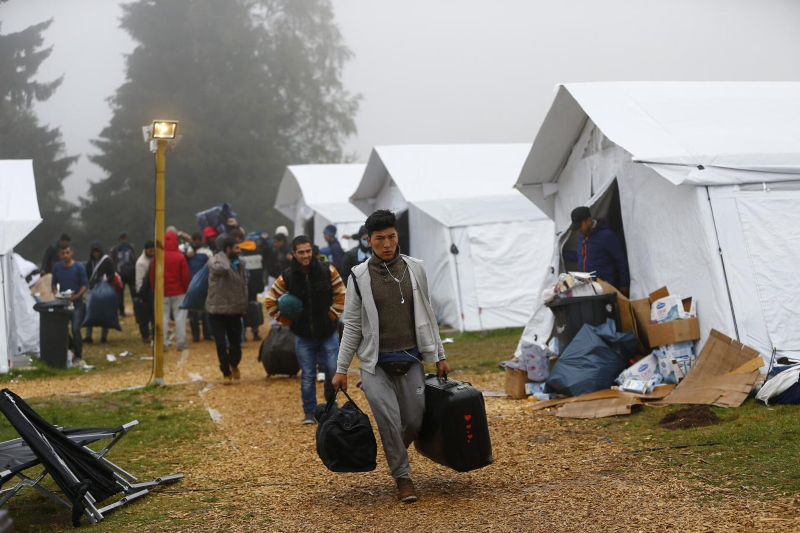
hamburg to build more temporary tents for asylum seekers amidst growing refugee crisis
In response to an escalating refugee crisis, Hamburg is creating additional tents to rapidly provide immigrants temporary accommodation. While the Asylum system strains to its maximum, the German city is striving to manage the increasing number of refugees, many of whom are spending lengthy durations in poor conditions. Stressing the urgency of addressing congestion in shelters as the situation in Hamburg is becoming worse, the German publication Die Welt covered on November 18 the decision to build extra tents.
The expansion of Hamburg’s tent shelter: a crisis stopgap solution
Early next year, Hamburg plans to install more than a dozen tents at three different places across the city. These new shelters will provide roughly 140 emergency quarters for refugees. Complementing the already in use shelters at Schnackenburgallee and Schlachthofstrasse, the tent accommodations will be available at Curslacker Neuer Deich, Stapelfelder Straße 7, and Wetternstraße. Considered as a temporary, although imperfect solution for the growing number of asylum seekers in the city, these handmade structures are a quick fix.
The global refugee crisis and increase of asylum seekers have aggravated years of intense pressure on Hamburg’s refugee accommodation system. The rising number of displaced persons leaving Syria, Afghanistan, Iraq, and more lately Turkey has seriously stretched local and federal resources. As Germany handles rising asylum applications, many refugees have unwittingly found long-term homes in makeshift shelters like these tents. Experts argue, however, that since immigrants live in impoverished and inappropriate settings for long periods of time, these policies are unsustainable and could hinder the integration process.
Poor Living Conditions in Emergency Shelters: An Emerging Concern
Key political organization in Hamburg, the Left party, has voiced serious concerns about the living conditions in emergency shelters including the recently larger tents. Speaking out about the issues at these shelters, party member Carola Ensslen has targeted the packed facilities and poor conditions. Among the filthy surroundings refugees in these makeshift shelters may face are mold and inadequate access to basic hygienic facilities. Moreover, the lack of cooking facilities makes it difficult for people to prepare their own food, which generates more problems for those who depend on inadequate shared meals.
Schlachthofstrange, for example, the typical stay was almost seven months; numerous couples and families stayed for more than twenty-one months. Similar depressing conditions apply at Schnackenburgallee, where some migrants stay for more than 13 months and the longest stay seen is 28 months. Apart from being uncomfortable, these protracted stays in temporary shelters have significant effects on the psychological and physical condition of the refugees. The congestion and unclean circumstances undermine their well-being, capability to fit into society, ability to find safe work, and capacity to build meaningful connections.
Hamburg’s Refugee System Foundering to Match Demand
Like many European cities, Hamburg has had shockingly high recent asylum application numbers. Mostly driven by refugees fleeing crisis in Syria, Afghanistan, and Iraq, the numbers have stayed high following the first wave of migrants in 2015. More lately, Turkish citizens fleeing their country into Germany have been considerably more frequent, therefore taxing the system.
In October Hamburg’s accommodation system was almost entirely full, running at 97.8% of its accessible capacity. The city’s refugee accommodation quota is set annually using a formula considering tax income and population count. Still, many cities—including Hamburg—are struggling to meet demand for homes given the current distribution system. Local governments in Germany are under great pressure to accommodate an increasing number of displaced people and families given 351,915 Asylum claims last year.
Keep Reading
More general European refugee crisis: issues and solutions
Hamburg’s challenge to house asylum seekers conforms more generally to a pattern affecting several European cities. The 2015 refugee crisis spurred changes in European migration policies; nonetheless, the basic problems of overpopulation and inadequate housing have not received enough attention. While the German government has endeavored to allocate Asylum seekers across the sixteen federal states of the country, many cities—including Hamburg—are finding it difficult to provide enough housing, healthcare, and integration support for every Asylum application.
Rising refugee count can be explained in part by geopolitical conflicts, natural disasters, and political upheaval all around that strains the European Asylum System. Local governments are also facing financial limitations and challenges making sure they have adequate resources concurrently to meet demand. Like other cities, Hamburg has seen reliance on temporary fixes—such as tent shelters—that offer immediate comfort but lack long-term solutions for the housing crisis.
The Place of Integration in the Refugee Conversation
Especially with relation to integration, the omission to give migrants enough and stable accommodation has wide effects. Many refugees find it difficult to support the economies of their home countries without safe accommodation, employment, or education and adapt into society. Extended stays in makeshift shelters also hinder their ability to build social ties and greatly help their surrounding areas.
For refugees whose mental health may suffer, extended stays in shelters offer uncertainty, loneliness, and discontent. Moreover, their incapacity to locate long-term accommodation frequently results in flux since they cannot progress toward their own objectives or future direction. Since integration becomes more difficult for people living in temporary shelters, experts argue that more money should be directed on improving housing standards and creating routes to permanent residence.
What Needs to Be Done: Encouragement of Ecological Solutions
The current situation in Hamburg highlights how urgently comprehensive changes in the refugee accommodation system—inside Germany as well as throughout Europe—are needed. Not building temporary shelters or depending on tents for emergency accommodation is a workable solution for the refugee dilemma. Rather, governments should focus on improving living conditions at shelters so that, in terms of basic needs—food, hygiene, and healthcare—that migrants have access to. Moreover, initiatives should be focused on providing refugees with social support networks, language classes, and job opportunities so they may fit into society.
While temporary solutions can satisfy immediate needs, long-term solutions are needed to ensure refugees may rebuild their lives with dignity and security. Local, national, and international stakeholders will have to interact more especially if we are to offer a more consistent and strong approach to refugee accommodation and integration.
While it works to expand its temporary shelters, Hamburg has to make long-term plans including permanent solutions to meet the growing demand for refugee housing. It is uncertain that the pressure on the asylum system will relax in the following years; so, proactive measures have to be carried out to ensure that refugees are not left living in insufficient and crowded conditions for protracted timeframes. Along with other European governments, the city has to give building consistent, long-term dwellings major importance, helping refugees starting anew in their host countries.
Hamburg’s attempt to accommodate refugees mirrors more general challenges many European cities dealing with the migration crisis experience. By addressing the fundamental causes of traffic and stressing sustainable integration projects, Hamburg can assist to ensure a better future for the communities they join as well as for refugees. The following months will be crucial as the city works to balance providing fast help with implementing long-term solutions supporting stability and integration.









